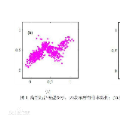Determining the number of clusters is a fundamental issue in data clustering. Several algorithms have been proposed, including centroid-based algorithms using the Euclidean distance and model-based algorithms using a mixture of probability distributions. Among these, greedy algorithms for searching the number of clusters by repeatedly splitting or merging clusters have advantages in terms of computation time for problems with large sample sizes. However, studies comparing these methods in systematic evaluation experiments still need to be included. This study examines centroid- and model-based cluster search algorithms in various cases that Gaussian mixture models (GMMs) can generate. The cases are generated by combining five factors: dimensionality, sample size, the number of clusters, cluster overlap, and covariance type. The results show that some cluster-splitting criteria based on Euclidean distance make unreasonable decisions when clusters overlap. The results also show that model-based algorithms are insensitive to covariance type and cluster overlap compared to the centroid-based method if the sample size is sufficient. Our cluster search implementation codes are available at https://github.com/lipryou/searchClustK
翻译:暂无翻译




